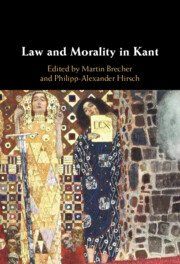Refine search
Actions for selected content:
591 results
Tenth Collection
- from Letters for the Advancement of Humanity
-
- Book:
- Johann Gottfried Herder: Letters for the Advancement of Humanity
- Published online:
- 13 December 2025
- Print publication:
- 22 January 2026, pp 496-565
-
- Chapter
- Export citation
Chapter 2 - Kant’s Hylomorphism and the Thing-in-Itself
-
-
- Book:
- The Aristotelian Kant
- Published online:
- 15 December 2025
- Print publication:
- 22 January 2026, pp 35-64
-
- Chapter
- Export citation
Chapter 8 - On “The Poet”
-
- Book:
- Emerson, the Philosopher of Oppositions
- Published online:
- 20 November 2025
- Print publication:
- 22 January 2026, pp 152-164
-
- Chapter
- Export citation

Law and Morality in Kant
-
- Published online:
- 16 December 2025
- Print publication:
- 22 January 2026
-
- Book
-
- You have access
- Open access
- Export citation

The Aristotelian Kant
-
- Published online:
- 15 December 2025
- Print publication:
- 22 January 2026

Hegel's Sublation of Transcendental Idealism
-
- Published online:
- 12 December 2025
- Print publication:
- 31 December 2025
-
- Element
-
- You have access
- HTML
- Export citation
Freedom, Democracy, and Economic Rights: A Kantian View
-
- Journal:
- Canadian Journal of Philosophy , FirstView
- Published online by Cambridge University Press:
- 05 December 2025, pp. 1-15
-
- Article
-
- You have access
- Open access
- HTML
- Export citation
Constitutional Heteronomy in Kant’s Legal Theory: An Internal Critique
-
- Journal:
- German Law Journal ,
- Published online by Cambridge University Press:
- 24 November 2025, pp. 1-19
-
- Article
-
- You have access
- Open access
- HTML
- Export citation
From democratic peace theory to a Kantian critical cosmology of peace
-
- Journal:
- International Theory , First View
- Published online by Cambridge University Press:
- 17 November 2025, pp. 1-28
-
- Article
-
- You have access
- Open access
- HTML
- Export citation
The Kantian Critique of Marx’s Property Theory
-
- Journal:
- Kantian Review , First View
- Published online by Cambridge University Press:
- 13 November 2025, pp. 1-19
-
- Article
- Export citation
Chapter 3 - Ørsted, Mach, and the History of Thought Experiment
- from Part I - The Origins of “Thought Experiment” in Kant and Ørsted
-
- Book:
- Kierkegaard and the Structure of Imagination
- Published online:
- 26 September 2025
- Print publication:
- 16 October 2025, pp 47-62
-
- Chapter
- Export citation
Chapter 14 - Cognition as Synthesis
- from Part III - Kierkegaard and the Concept of Thought Experiment
-
- Book:
- Kierkegaard and the Structure of Imagination
- Published online:
- 26 September 2025
- Print publication:
- 16 October 2025, pp 230-247
-
- Chapter
- Export citation
Chapter 6 - Varieties of Cognition
- from Part II - A Kantian Account of Thought Experiment
-
- Book:
- Kierkegaard and the Structure of Imagination
- Published online:
- 26 September 2025
- Print publication:
- 16 October 2025, pp 89-106
-
- Chapter
- Export citation
Conclusion
-
- Book:
- Kierkegaard and the Structure of Imagination
- Published online:
- 26 September 2025
- Print publication:
- 16 October 2025, pp 248-256
-
- Chapter
- Export citation
Chapter 5 - Rationalism and the Question of Intellectual Intuition
- from Part I - The Origins of “Thought Experiment” in Kant and Ørsted
-
- Book:
- Kierkegaard and the Structure of Imagination
- Published online:
- 26 September 2025
- Print publication:
- 16 October 2025, pp 76-86
-
- Chapter
- Export citation
Chapter 4 - Empiricism and Kantian Accounts of Thought Experiment
- from Part I - The Origins of “Thought Experiment” in Kant and Ørsted
-
- Book:
- Kierkegaard and the Structure of Imagination
- Published online:
- 26 September 2025
- Print publication:
- 16 October 2025, pp 63-75
-
- Chapter
- Export citation
Chapter 12 - Like Entering a Bright Room?
- from Part II - Historical and Philosophical Implications
-
-
- Book:
- Kant on Language
- Published online:
- 19 September 2025
- Print publication:
- 09 October 2025, pp 217-233
-
- Chapter
- Export citation
Chapter 9 - Cassirer on Kant and W. v. Humboldt on Language: “Die Freiheit und Selbständigkeit des geistigen Tuns”
- from Part II - Historical and Philosophical Implications
-
-
- Book:
- Kant on Language
- Published online:
- 19 September 2025
- Print publication:
- 09 October 2025, pp 160-177
-
- Chapter
- Export citation
Chapter 3 - Kant and the Idea of a Language in ‘the Senses’
- from Part I - Linguistic Implications of Kant’s Thought
-
-
- Book:
- Kant on Language
- Published online:
- 19 September 2025
- Print publication:
- 09 October 2025, pp 48-66
-
- Chapter
- Export citation
Chapter 15 - Was Kant an Expressivist?
- from Part II - Historical and Philosophical Implications
-
-
- Book:
- Kant on Language
- Published online:
- 19 September 2025
- Print publication:
- 09 October 2025, pp 275-294
-
- Chapter
- Export citation
